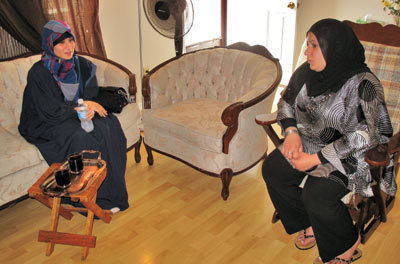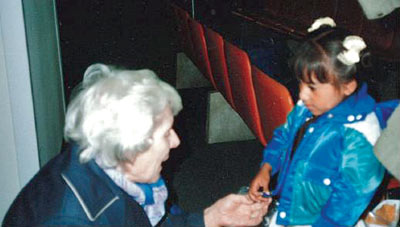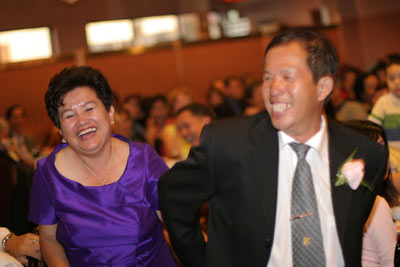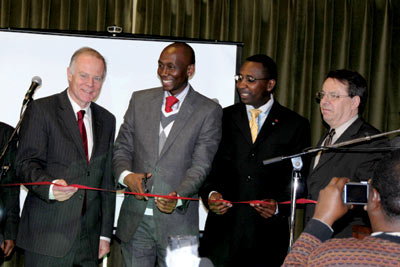Canadian Mennonite
Volume 14, No. 12
June 14, 2010
Stories to tell
MCC Ontario seeks to reconnect with sponsored refugees from years gone by
 |
After welcoming us into her new home, Suad Saidam promptly excuses herself, re-emerging with ice-cold water bottles on a silver tray. In Arab cultures, guests are always served refreshments in this way, one of the many hallmarks of their unending hospitality.
Suad, her husband Mamdoh, and their four children, Tabarak, 12, Ali, 11, Assal, 10, and Yuseef, 6, have only been in Canada for four months, but they’re working hard to make a life for themselves in Cambridge, Ont., having arrived in this country through Mennonite Central Committee (MCC) Ontario’s refugee sponsorship program and the efforts of Wanner, Breslau and Preston Mennonite churches in southern Ontario.
The Saidams are quick to express their gratefulness and joy at their new lives in Canada, frequently punctuating their narratives with el-Hamdallah (“Praise be to God”).
Translator Noha Abdul Ghaffar explains that the name of their refugee camp on the Iraq/Syria border, Al Hol, translates roughly as “the nightmare.” The family spent five years there after fleeing their native Iraq, when violence erupted between Sunni and Shi’a Muslims.
Referring to that time, Suad explains, “Every time someone left the house, whether it was Mamdoh going to work or Tabarak to school, I assumed I would never see them alive again.”
The whole family witnessed scenes of torture, and Suad’s cousin was killed because he was Sunni. When a classmate of Tabarak’s was kidnapped and murdered because she, too, was Sunni, the Saidams decided they had had enough.
The family first tried to escape into Jordan, but they had no citizenship. Although both Suad and Mamdoh were born and raised in Iraq, as were their parents before them, their grandparents came to Iraq from Palestine, which made their entire family ineligible for citizenship. Jordan, not wanting to encourage Palestinian refugees, would not accept them. The family, along with several other Iraqi Palestinians, could do nothing but literally sit in the desert for two months with almost no resources.
Mamdoh explains that for the first two days they had no food or water, and they were worried about their children. The men built a circle with suitcases and used their coats as a roof to provide some protection from the heat for the women and children. Finally, the United Nations brought rations, and eventually moved them to Al Hol.
With neither Iraq nor Syria willing to claim them, Palestinian Iraqi refugees are stranded on an isolated stretch of desert. This isolation had devastating effects for the Saidams, who lost a newborn daughter, Gazal, when they didn’t have access to a hospital.
Adjusting to a new language and culture isn’t easy. They struggle with loneliness, and Suad particularly misses her mother, who fled to Cyprus and is unwell. “Every time I speak to her she tells me she is afraid she will die before I can see her,” Suad says. “I am trying very hard to find a sponsor for her, but it isn’t easy.”
Despite their troubles, Mamdoh says his greatest joy in Canada is how bright the future looks for his children. Suad agrees, and mentions the joy she finds in the people who have helped them.
Sponsored by the three Mennonite congregations, the Saidams appreciate that “the Mennonites are very respectful of us and our culture.” Mamdoh says of the MCC Private Sponsorship Program, it is “the best way. At every step we have been taken care of and supported.”
Christina Edmiston, a member of Wanner’s sponsorship committee, feels strongly that the sponsorship program is a two-way street. “I absolutely do not think that this is just us giving to them,” she says. “We have been so blessed from their friendship. They have taught us a lot about our priorities with regard to time, family, etc.”
 |
‘Surely this was the work of God’
Johanna Dyck agrees with Edmiston’s assessment. Her church, Kitchener Mennonite Brethren, Ont., sponsored the Avalos family from El Salvador in 1990. “We used to have potlucks, because that ensured there was something for the family to eat that was familiar,” she says, adding, “and, of course, that meant we got to eat their delicious food, too!”
Dyck recalls meeting Marina and Antonio Avalos, along with their children, Ricardo, Ana and Willmer, at the airport when they arrived in March of 1990. “It was a very cold day, and they were all dressed for the tropical climate they had come from, with bare feet and sandals,” she says. “Fortunately, there were snow suits for them to change into. But their hotel room wasn’t ready, so we had to sit in a cold basement room with them until about 2 a.m.”
While they sat together, the family and their sponsors got acquainted. As it turned out, Antonio had become good friends with MCC workers in the refugee camp in El Salvador, where they lived for most of the 1980s. These MCC workers had suggested they find a Mennonite church to attend once they arrived in Canada. They were very moved that, of all the sponsors and new arrivals in this group, they had been matched with the only Mennonite church involved.
“Coincidence?” Dyck wonders.
“No, surely this was the work of God,” she quickly adds.
Like most new Canadians, the Avalos family struggled with language. This provided a memorable time for Dyck, when Marina went into labour in the middle of the night. Dyck rushed to the house of their translator to take her to the hospital, but couldn’t get a response with the doorbell or by knocking. She ended up climbing through the bushes to pound on the windows and yelled until she succeeded.
Over the past 20 years, the Avalos family has remained closely connected with Kitchener MB, and continues to express its deep appreciation to MCC and the congregation for all of their support. This has included the birth of a fifth child, and the arrival of Antonio’s oldest daughter, who he had believed was dead.
Early refugee works hard to succeed
Family reunions are one of the greatest joys of the MCC private sponsorship program.
Fleeing the Khmer Rouge, Lo Chiang Cheng’s family came to Canada from Cambodia in 1979, when she was seven years old. The family—including her parents Tak Chhing Cheng and Khantry Chin, and two younger sisters, Lo Mey, 3, and Lo Sing, 1—were soon joined by Tak Chhing’s uncle and his family, reuniting cousins that had grown up together as siblings. After that, Tak Chhing’s sisters and brothers were sponsored in Ottawa, so the Chengs moved from Orillia, Ont., to be near them.
Coming as a child, Lo Chiang is the embodiment of new arrival Mamdoh’s hopes for his children. With a master of business administration degree from Queen’s University, Kingston, Ont., Lo Chiang works in management for the federal government.
“My parents viewed this as a second chance, and drilled it into us to work hard, so we would never have to start from scratch again,” Lo Chiang says.
Both parents led by example, with Tak Chhing eventually opening his own construction company.
Like Yuseef, the youngest member of the Saidam family, Lo Chiang was too young to remember her life in Cambodia before the Buriram Refugee Camp in Thailand, where her family spent two years. She remembers the challenges of life in the camp, though, particularly never having enough food.
She recalls with a laugh how, when anyone in Canada would give her or her sisters something to eat, they would hide it to save for later. When asked to reflect on her joys of growing up in Canada, she immediately exclaims, “Not being hungry! And feeling safe. Also, having a lot of support. The church [Christian Fellowship Chapel, Orillia, Ont.] was always there for us.”
When some local kids started bullying Lo Chiang and Lo Mey, the church immediately stepped in.
“One of the sponsors’ daughters started walking us to school and [the church] talked to the teachers,” she says.
Lo Chiang became close with another little girl, who remains a good friend, saying, “My sisters and I were much smaller than we should have been for our age, and I just remember her taking care of me, and protecting me.”
Hilda Gowanlock, one of the church sponsors, remembers just how malnourished the children were. “One night, while my husband took the parents to an ESL [English as a second language] class, I babysat the girls,” she says. “They were a little afraid, so I decided to lie on the bed with them to make them feel more secure. The baby was so emaciated she couldn’t even sit up on her own. I was so worried that she wouldn’t make it. But she did!”
 |
Seeking to reconnect with refugees
It was people such as the Chengs that brought the MCC sponsorship program into being in the first place. In the 1970s, images of the humanitarian crisis in Southeast Asia prompted an outcry that resulted in the sponsorship of hundreds of thousands of refugees to Europe, Australia and North America. In Canada, MCC signed an agreement with the federal government constituting the first ever Private Sponsorship of Refugees Program.
To this day, Canada is the only country in the world that allows private sponsorships. Churches, individuals and even small businesses have responded by the thousands, sponsoring more than 50,000 refugees through MCC to date. With a number that large, it is important to remember that every one of these “refugees” is a person who has a life beyond their traumatic ordeals. They have their own hopes, dreams and memories, and each has a story to tell.
People often forget how much these new Canadians enrich and contribute to this country. That’s why MCC Ontario is seeking to re-connect with former refugees who have come through its sponsorship program, believing that having former refugees become more involved in the work of MCC Ontario will provide invaluable new insight for its programs, particularly the sponsorship program.
Reflecting on her involvement with the Avalos family, Dyck explains that her interest in sponsorship is the result of her own experience, having come to Canada from Russia with her mother in the 1920s, when she was five. This was at the same time that MCC was founded as a response to Mennonites in Russia and Ukraine who were suffering from persecution and famine. While most of MCC’s work at the time involved material aid, it also helped settle thousands of these people in Canada and the U.S.
Seventy years later, Dyck “paid it forward,” as her church helped to sponsor a family that came through the MCC private sponsorship program that came into being as a result of people like Lo Chiang Cheng and her family.
For more information, or to become involved, e-mail our.stories@mennonitecc.on.ca or call toll-free 1-800-313-6226.
A refugee helping refugees
Congolese immigrant now assists other newcomers to continue the work they did at home in Canada
Winnipeg, Man.
 |
For Serge Kaptegaine, the opening ceremonies for Ref-Nyota, a new business venture that promotes the skills and talents of refugees, was an answer to prayer. The event was held at Le Centre Culturel Franco-Manitobain, Winnipeg, on April 23.
Kaptegaine came as a refugee from the Democratic Republic of Congo in 2005. Always a man dedicated to peace, Kaptegaine, a young soft-spoken French teacher in a Congolese village, was trying to bring rival rebel groups together to dialogue with one another when he fell into the wrong hands.
Friends assisted him in his escape and he was hastily delivered to Winnipeg, with no time to inform his wife and two young children. Once in Winnipeg, the adjustments were many, not least of them being the courage to walk into Home Street Mennonite Church that presented him with a sea of white faces. If it weren’t for the words “merciful peace” that he heard from the pulpit, he says he would have turned and left. But he wanted to hear more.
In 2006, Kaptegaine told Dan Dyck of Mennonite Church Canada, “My country, my people, need this Mennonite message of peace.” He became the coordi-nator of Hand in Hand for Peace in the Congo, a local Congolese group working to raise awareness of a conflict in their country. At that time Dyck wrote, “His story has just begun.”
While he continues to teach French in Winnipeg, Kaptegaine has never lost focus of the gospel message that promotes love, peace and reconciliation. He is involved with Save the Children in Congo and with War Child Canada, but for the past year most of his energy has gone into building Ref-Nyota.
“All the refugees of war who come to Canada have problems getting jobs that use their skills and talents,” says Kaptegaine. “So far, the new business has worked mostly with refugees from Angola, the Congo and Sudan, but it is not just for refugees from those countries. There is no boundary to suffering.”
Ref-Nyota assists the refugee community to become fully engaged in the Canadian workforce by introducing their products, services and creative strengths to potential employers.
Kaptegaine gave the example of one refugee who came to Winnipeg with his family. He was a tailor and a maker of cloth. He wanted to continue the work he was familiar with, but as it is with so many refugees, “the cultural differences, the language, the stress got in the way,” says Kaptegaine. Ref-Nyota, which means “refugee stars” in Swahili, helped establish “a network of stores to which he now sells his cloth. He is able to work with his wife at home,” notes Kaptegaine.
This new service has also helped musicians find venues where they can perform, enabled one woman to offer African cooking classes, provided legal assistance and helped with publicity for refugees. “There are 14 of us with different skills who are directly involved in Ref-Nyota,” he says, “but indirectly we are more than that. It is amazing to see how the community has responded to this. The Canadian community has a big heart to help people.”
Several years ago Kaptegaine was able to save enough money to help his wife and children move to Germany while they waited for documents to immigrate to Canada. ”We kept in touch on the phone and I visited them in Germany, but my wife got married there,” he says. “It was very hard. Everything was ready, but I am learning to accept.”
On March 18, Kaptegaine became a Canadian citizen. He knows that he will never be able to return to the Congo, but that does not lessen the passion and concern he has for his people, including more than 500 families who have come to Winnipeg.
Kaptegaine continues to attend Home Street Mennonite Church on an occasional basis. “Mennonites have a conviction of peace, but to belong to a particular religion, I avoid that,” he says. “I have seen what religion was able to do and how it divides people. I belong to God. I’m a believer.”
“Because of the evil I have seen people commit, I don’t see God in people, but I try to see people through God’s eyes,” he says, adding, “I try to love because God is love. This continues to keep me strong.”
Inspired by ‘my second dad’
Laotian refugee has photo selected by National Geographic
Drake, Sask.
 |
Inspired by Western Canada’s prairie landscape and the ever-changing light in the sky there, Chai Bouphaphanh spends his leisure time exploring his surroundings through the lens of a camera. His most recent success is having a photograph that he entered in a contest selected for the National Geographic collection of photographs (see page 9).
“The timing was perfect, the beam of light looks like energy coming from two people in love,” he says as he reflects on the photo that captures intense rays of sunlight engulfing a couple on their wedding day. The photo was taken at the Jackfish Lodge Golf Course in North Battleford, Sask.
Bouphaphanh’s interest in photography goes back to his childhood, when the late Wally Ewert, a man that Bouphaphanh describes as “my second dad,” captured treasured memories of birthday parties, picnics and many other family events through photography. “Wally took a lot of pictures of our family,” recalls Bouphaphanh, adding, “He was a photographer and was always taking pictures.”
This was among many small and seemingly insignificant gestures of friendship that helped Bouphaphanh, his parents and two younger brothers feel at home in Drake, a small rural village north of Regina. The refugee family from Laos was sponsored by North Star Mennonite Church, Drake, through the newly formed Mennonite Central Committee (MCC) Canada private sponsorship program.
Bouphaphanh, now an employee at Drake Meats, was 11 years old in 1980 when his family arrived in this village of fewer than 300 people on a blustery winter day in February.
“We felt we were living in the middle of nowhere,” says Bouphaphanh, explaining that their sense of isolation markedly decreased the first Sunday they attended North Star Mennonite. “We went to church and saw 200 people in church. We realized then, there are people living here.”
It was through the church that the Bouphaphanh family met Claire Ewert Fisher, now executive director of MCC Saskatchewan, her late husband Wally, their children and extended families.
“Claire and Wally had lived in Vietnam and could relate to the political situation that forced us to emigrate,” Bouphaphanh says. “We became very close. We became a family.”
One of the first treasured memories of this friendship was of receiving the May 1979 issue of National Geographic, an issue that featured stories, photographs and a map of Saskatchewan.
“That’s how I learned about Saskatchewan,” he explains. Over the years, Wally gave him many more issues and they shared an enjoyment of admiring the high-quality photographs in the magazine.
In 1984, the Ewerts served as MCC workers in Thailand for four months and visited Bouphaphanh’s maternal grandmother and other relatives. “Wally took pictures of my mom’s family. That was very special for our whole family,” he says.
Bouphaphanh’s volunteer activities include taking photographs for the Open Door Society in Regina, an organization that supports newcomers to the province’s capital city. A rewarding project was taking photographs for the 2007 public education calendar, “Dispelling the Myths,” that shows the strength of newcomers and the contributions they make.
In 1991, the Bouphaphanh family was part of the Ewert family’s support network when Wally died unexpectedly from a heart attack. “They [the Bouphaphanh family] received support when they needed it,” says Claire, “and over the years they have supported us in ways we would not have imagined.”
“Such a strong bond of friendship develops between people who care about each other that you indeed become one family,” she says, adding, “We have felt that kind of support from them and they continue to treat us like family.”
A history of private sponsorship
A new Immigration Act for Canada in 1976 included a provision for private sponsorship of refugees. A Mennonite Member of Parliament, Jake Epp from Steinbach, Man., had been advocating this option in order for church and community groups—the private sector—to become involved in settling people in Canada.
Along with changes in Canadian immigration policy in the late 1970s, the international scene changed dramatically and there was a huge exodus of people from Laos, Cambodia and Vietnam. They were fleeing persecution and unstable political and economic conditions. Hundreds of thousands of people were fleeing, some over land, others crowded onto boats and became known as the “boat people.”
Across Canada that year—1979—churches, community groups and others were offering to sponsor refugees. There were more than 7,000 groups involved, primarily church groups. During this time, the Mennonite Central Committee (MCC) Ottawa office initiated discussions with the government to draft a refugee sponsorship agreement. The purpose of this agreement was to make the process easier.
MCC would assume the overall responsibility for all Mennonite churches and groups that wanted to sponsor refugees. These churches and groups would not have to deal with the government bureaucracy; MCC would do that. It was a remarkable innovation. MCC became the first official sponsorship organization. The Canadian minister of immigration at the time, Bud Cullen, attended a signing ceremony at the MCC offices in Winnipeg.
Mennonite churches sponsored almost 4,000 refugees from Indochina in 1979 and 1980, which was more than 10 percent of all private sponsorships. Almost half of all Mennonite churches across Canada sponsored a family.
How to become a refugee sponsor
Mennonite Central Committee (MCC) Ontario assists refugees who have suffered persecution, violence and human rights abuses to resettle in Canada through partnerships with churches and other constituencies.
In partnership with constituent churches, the refugee sponsorship program facilitates the process of refugee sponsorship to Canada. Churches or constituent groups commit to provide the sponsored family with housing, financial support for food, clothing, transportation and other materials needed for one year.
As refugees are resettled, they are given the gift of a new beginning.
Training opportunities and support are provided to the sponsoring churches throughout the stages of the process.
Sponsorship priorities include women at risk, large families and families with no links to Canada. Cases for resettlement are referred to MCC by the United Nations High Commissioner for Refugees, Citizenship and Immigration Canada, MCC partners overseas, churches and families.
With the support of MCC, Mennonite and Brethren in Christ churches can help to welcome refugees to Canada. By offering hospitality, you can be assured that the king will say to you, “I tell you the truth, whatever you did for one of the least of these brothers of mine, you did for me” (Matthew 25:40).
For more information, contact Moses Moini at mosesm@mennonitecc.on.ca or call toll-free at 1-888-622-6337.
For discussion
1. What experiences have you or your congregation had in sponsoring refugees? What have been the most challenging and rewarding parts? What motivates a congregation to sponsor a refugee family?
2. Some of the refugees, previously assisted by Mennonites, now have their own congregations (such as First Hmong Mennonite, Kitchener, Ont.). Should refugees be encouraged to attend or join their sponsoring church? What happens when the refugees are devout Muslims?
3. Refugees arrive in Canada virtually destitute. How can sponsors help them maintain their dignity? How much gratitude should sponsors expect? When refugees move to another city or community after the year of sponsorship is over, how should that be interpreted?
4. The Canadian government is presently discussing Bill C-11, which would deport more refugee claimants by refusing appeals (see May 17 issue, page 18). Does Canada have a good policy in dealing with refugees? Should we accept more refugees?
5. Chai Bouphaphanh describes how rural Saskatchewan felt like the middle of nowhere to his family. What are the advantages and disadvantages of settling refugees in a small town rather than a multicultural city? What can rural churches do to help refugees with feelings of isolation?